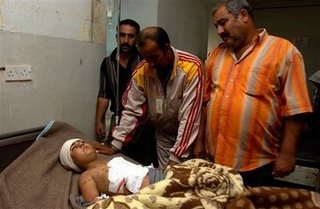Medics beg for help as Iraqis die needlesslyHalf of all deaths preventable, say country's medics
Reconstruction seen as disaster
More than 2,000 doctors and nurses are killed
18,000 more leave the nation
Even the most basic treatments are lacking
By Jeremy Laurance, Health Editor
Published: 20 October 2006 The disintegration of Iraq's health service is leaving its civilians defenceless in the continuing violence that is rocking the country, Iraqi doctors warn today. As many as half of the civilian deaths, calculated at 655,000 since the 2003 invasion, might have been avoided if proper medical care had been provided to the victims, they say. In separate appeals, the doctors beg for help to stem the soaring death rate and ease the suffering of injured families and children. They say governments and the international medical community are ignoring their plight. In the first 14 months after the 2003 invasion almost $20bn (£11bn) was spent on reconstruction by the British and American funds, including hundreds of millions on rebuilding and re-equipping the country's network of 180 hospitals and clinics. But billions went missing because of a combination of criminal activity, corruption, and incompetence, leaving Iraqis without even the essentials for basic medical care. The violence for which the Allied forces failed to plan has meant a $200m reconstruction project for building 142 primary care centres ran out of cash earlier this year with just 20 on course to be completed, an outcome the World Health Organisation described as "shocking". In March,the campaign group Medact said 18,000 physicians had left the country since 2003, an estimated 250 of those that remained had been kidnapped and, in 2005 alone, 65 killed. Medact also said "easily treatable conditions such as diarrhoea and respiratory illness caused 70 per cent of all child deaths", and that " of the 180 health clinics the US hoped to build by the end of 2005, only four have been completed and none opened". Writing in the British Medical Journal today, Dr Basssim Al Sheibani and two colleagues from the Diwaniyah College of Medicine in Iraq says that, as the violence escalates, "the reality is we cannot provide any treatment for many of the victims." "Emergency departments are staffed by doctors who do not have the proper experience or skills to manage emergency cases. Medical staff ... admit that more than half of those killed could have been saved if trained and experienced staff were available." They say equipment, supplies and drugs are in many cases unobtainable. " Many emergency departments are no more than halls with beds, fluid suckers and oxygen bottles." They add: "Our experience has taught us that poor emergency medicine services are more disastrous than the disaster itself. But despite the daily violence that is crushing Iraq, the international medical community is doing little more than looking on" The shortages were graphically highlighted in a Channel 4 Dispatches documentary made by GuardianFilms, and broadcast in February. It revealed that children with diarrhoeal disease were dying of dehydration because hospitals lacked the right sized needles to inject them with fluids. In Diwaniyah children's hospital, doctors were shown struggling to give drugs by ventilation to a two-day old girl, Zehara, who was born with underdeveloped lungs, because they had the wrong sized plastic mask. Masks costs pennies but, like all other equipment, are in short supply. Zehara's father was dispatched on to the streets to try to buy Vitamin K on the black market, urgently needed for an injection. But it was too late - by the time he returned, she was dead and her twin brother also passed away shortly afterwards. In a separate report yesterday, Peter Kandela, an Iraqi doctor who has practised as a GP in Surrey for 30 years, travelled through Jordan and Syria interviewing Iraqi medical staff who had escaped the violence. "The current Iraqi brain drain is the worst the country has seen in its modern history," he writes "In the new Iraq there is a price tag linked to your position and status. Those doctors who have stayed in the country know what they are worth in kidnapping terms and ensure their relatives have easy access to the necessary funds to secure their speedy release if they are taken." He describes a kidney surgeon seized by a group of armed men, despite the presence of security guards who he had hired to protect himself, whose first act was to go through his contacts book for other potential victims. " They had the audacity to suggest that in return for receiving better treatment inn captivity I should recommend others for kidnapping", the surgeon said. He was released unharmed after a ransom of $250,000 was paid by his wife. In Baghdad where no one can escape violence, hospitals provided the last refuge. But they are now unsafe and Iraqis are avoiding them. Public hospitals in the city are controlled by Shiia - who have come under suspicion for allowing death squads to enter them to kill Sunnis. Abu Nasr, the cousin of a man injured in a car bomb who was dragged from his hospital bed and riddled with bullets, told the Washington Post: "We would prefer now to die instead of going to the hospitals. I will never go back to one, never. The hospitals have become killing fields." Medical notes34,000 The number of Iraqi physicians registered before the 2003 war. 18,000 The estimated number of Iraqi physicians who have left since the 2003 invasion. 2,000 The estimated number of Iraqi physicians murdered since 2003. 250 The number of Iraqi physicians kidnapped. 34 The number of reconstructive surgeons in Iraq before the 2003 invasion. 20 The number who have either been murdered of fled. 72 per cent of Iraqis needing reconstructive surgery are suffering from gunshot or blast wounds. 164 The number of nurses murdered - 77 wounded. $243,000,000 The amount of money set aside by US administration to build 142 private health clinics in post-invastion Iraq. 20 The number of such clinics built by April 2006. $0 The amount of money left over. $1bn The amount of money the US administration has spent on Iraq's healthcare system. $8bn The amount of money needed over the next 4 years to fund the health care system 70 the percentage of deaths among children caused by "easily treatable conditions" such as diarrhoea and respiratory illnesses. 270,000 The number of children born after 2003 who have had no immunisations. HEALTH INDICATORS:68 per cent of Iraqis with no access to safe drinking water. 19 per cent of Iraqis with sewerage access.
markfromireland | 
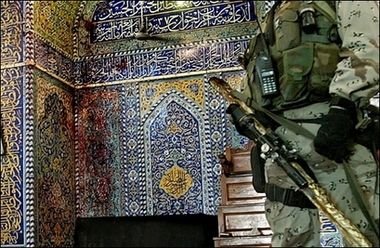 I've often been inside this mosque which was targetted by another suicide bomber today. It's very beautiful - and very tranquil. I first went there as a child. What was a Christian kid doing there? I was brought there on a pilgrimage when we were posted to Lebanon. Our parish priest organised a pilgrimage to the "place abundant with palms" for the children of the parish.
I've often been inside this mosque which was targetted by another suicide bomber today. It's very beautiful - and very tranquil. I first went there as a child. What was a Christian kid doing there? I was brought there on a pilgrimage when we were posted to Lebanon. Our parish priest organised a pilgrimage to the "place abundant with palms" for the children of the parish.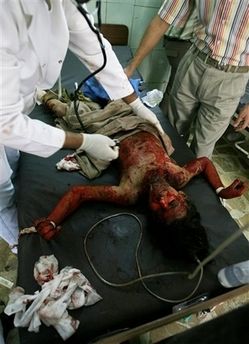
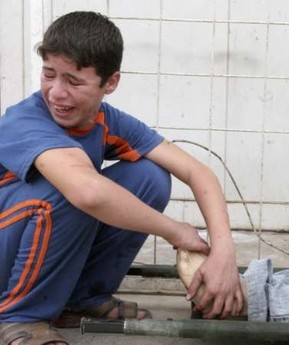
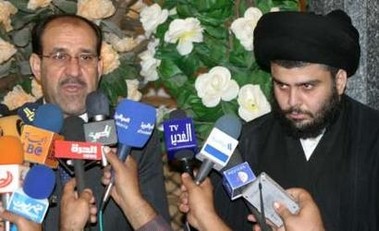 Maliki's chance to unify Iraqis came at the start of his term. If (big if) he had demanded that US troops leave his country, he might (big might) have been able to gather enough support to be able to face down al-Sadr and al-Hakim. Instead as we know he was forced to publicly throw in lot with the hated occupiers. Today (Aswataliraq Arabic Language) he was reduced to denying that his government came to power "
Maliki's chance to unify Iraqis came at the start of his term. If (big if) he had demanded that US troops leave his country, he might (big might) have been able to gather enough support to be able to face down al-Sadr and al-Hakim. Instead as we know he was forced to publicly throw in lot with the hated occupiers. Today (Aswataliraq Arabic Language) he was reduced to denying that his government came to power "

